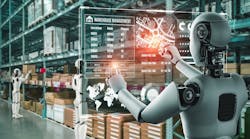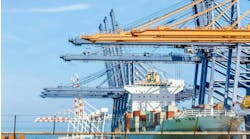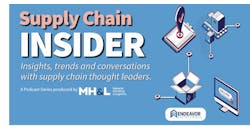Supply chain challenges brought on by a global COVID-19 pandemic, inflation, climate change and geopolitical events, have supply change executives seeking new ways to future-proof their supply chains. A new IBM Institute for Business Value (IBV) study "Own Your Transformation" surveyed 1,500 CSCOs and Chief Operating Officers (COOs) and found that companies are turning to automation, AI and intelligent workflows, ecosystems, and sustainability, in an effort to reimagine their supply chain operations.
"To effectively combat the unprecedented supply chain stressors like inflation, it's imperative that CSCOs focus on using analytics, AI and automation initiatives to build intelligent, resilient, and sustainable supply chains," said Jonathan Wright, IBM Consulting Global Managing Partner, Sustainability Services and Global Business Transformation, said in a statement. "Automation and AI can enable CSCOs and their organizations to collect data, identify risk, validate documentation, and provide audit trails, even in high inflationary periods, while also managing their carbon, waste, energy and water consumption."
Key study findings show that:
CSCOs are embracing AI and automation technologies to provide interconnectivity with partners and suppliers and to enable sustainable operations and predictability.
- Almost half (47%) of surveyed CSCOs said they have introduced new automation technologies in the last two years—an approach that can add predictability, flexibility, and intelligence to supply chain operations, and they're using AI to help monitor and track performance.
Sustainability is both a challenge and a force for change.
- Surveyed CSCOs rank sustainability as their third biggest challenge in the next few years, trailing only supply chain disruptions and technology infrastructure.
- 52% place sustainability at or near the top of their priority list.
- 50% report that their sustainability investments will accelerate business growth.
- They tell us that they experience the most direct pressure for sustainability transparency from: investors (56%), board members (50%) and customers (50%).
"The Innovators": 20% of respondents stand apart for accelerating their data-led innovation to prepare for a precarious future, and this group is already outperforming peers on key metrics including reporting 11% higher annual revenue growth. They are:
- Integrating automated workflows across organizational functions and with their partners for real-time visibility, insights, and action (95% more than other CSCOs).
- Modernizing their technology infrastructure – 56% are currently operating on hybrid cloud, and 60% are investing in digital infrastructure to scale and deliver value.
- Extending their sustainability initiatives, creating new products and services. 58% see opportunities to improve customer engagement through sustainability imperatives.
- Focusing deeper on cybersecurity (nearly 20% more than other CSCOs).



